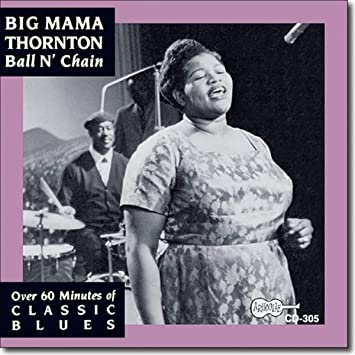Music |
Big Mama Thornton
By
Published: Aug 05, 2020
Category:
Blues
The first night she sang at Harlem’s Apollo Theater, she was Willie Mae Thornton, and she was the opening act. The following night, as "Big Mama" Thornton, she was the headliner.
That overnight success came in 1952, when Willie Mae was 26. By then, she had moved far beyond the gospel songs she learned in the churches of Montgomery, Alabama, where her father was a minister and her mother sang in the choir. Now she was living in Houston, performing in clubs, learning to play drums and harmonica, drinking gin and milk, and being open about her sexuality decades before it was cool to be a lesbian.
“My singing comes from my experience…my own experience," she said. "I never had no one teach me nothin’. I never went to school for music or nothin’. I taught myself to sing and to blow harmonica and even to play drums by watchin’ other people! I can’t read music, but I know what I’m singing! I don’t sing like nobody but myself.”
Of the 16 songs on the "Ball & Chain" CD, recorded when she was in her early 40s, two were huge hits — for others. One was "Hound Dog," which she first recorded three years before Elvis got to it.
And then there is "Ball N’ Chain," which Big Mama wrote and owned until Janis Joplin started using it as her show-stopper.
But the amazing thing about this CD is that these two classics are matched by almost every other song on it. In part, that’s because the musicians playing with her are world-class. On the first few songs, her band features Buddy Guy (guitar), Walter Horton (harmonica) and the great Fred Below (drums). On two cuts, her only accompaniment is Fred McDowell’s slide guitar. And for six glorious songs, she’s backed by a band that includes Muddy Waters (guitar), James Cotton (harmonica) and the incomparable Otis Spann (piano). [To buy "Ball ‘N Chain" from Amazon, click here. For the much more reasonably priced MP3 download, click here.]
Mostly, though, what transports you is Big Mama. Her range astonishes. One moment, she’s a crude shouter, loud enough to hush belligerent drunks; the next moment, she’s the repository of all the heartache in the world. You’ll listen carefully to "Sweet Little Angel" because no one’s done it better.
And you’ll want to get up and dance to "Wade in the Water," because she’s singing flat-out gospel against a pounding tambourine and a scorching guitar.
But on the twentieth hearing, or thereabouts, you will listen to Otis Spann’s hushed piano against her forlorn voice in "Life Goes On" and feel something like awe.
Big Mama never knew real success. She got royalties of $500 for "Hound Dog," her first and only commercial hit. She lived hard. She drank more than was good for her. She died in l984, aged 62, in a Los Angeles rooming house.
Naturally, she’s much more popular now than she was when she was alive.


